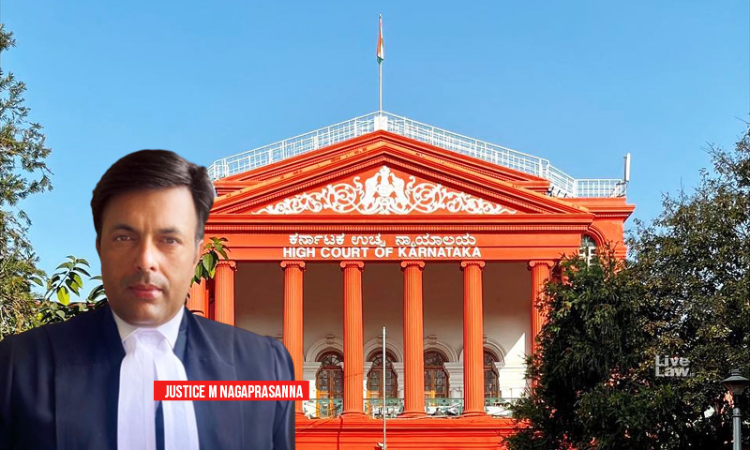- Home
- /
- High Courts
- /
- Karnataka High Court
- /
- Duty Of Deed Writers To Look Into...
Duty Of Deed Writers To Look Into All Papers Before Scribing A Deed, Which Includes Investigating Title Over Property: Karnataka HC
Mustafa Plumber
22 Jan 2025 3:15 PM IST
The Karnataka High Court has refused to quash a criminal case registered against a licensed deed writer accused of writing an agreement for the sale of a land based on a general power attorney (GPA) which was allegedly a forged one.Justice M Nagaprasanna dismissed the petition filed by one Shekar and said “Merely because he is a deed writer, the proceedings against him cannot be quashed, as...
The Karnataka High Court has refused to quash a criminal case registered against a licensed deed writer accused of writing an agreement for the sale of a land based on a general power attorney (GPA) which was allegedly a forged one.
Justice M Nagaprasanna dismissed the petition filed by one Shekar and said “Merely because he is a deed writer, the proceedings against him cannot be quashed, as the offence of forgery and using forged document to be genuine and criminal breach of trust by the petitioner are prima facie met. Therefore, these are matters where investigation would be required”.
Venkat Ranjith Pattibandla, the General Power of Attorney (GPA) holder of one Yalamanchali Jithin Kumar–his father-in-law was tasked with administering the latter's property as he resides in Andhra Pradesh and had filed a complaint. It was alleged in the complaint that the property was purchased in the year 2019 and on 08-08-2024 he discovered that one YM Jithin Kumar, son of Janardhana Rao, accused No.1 has entered into a sale agreement with accused Nos.2 and 3 in respect of the afore-mentioned property for a consideration of ₹1.15 crores.
A crime was registered on the ground of impersonation of Yalamanchali Jithin Kumar and execution of agreement of sale on forged documents for sections 409(Criminal breach of trust by public servant, or by banker, merchant or agent), 419(Punishment for cheating by personation), 465(Punishment for forgery), 468(Forgery for purpose of cheating) and 34 (common intention) of the Indian Penal Code. The petitioner–Shekhar, is accused No.4 and the Sub-Registrar of Doddaballapura is accused No.5.
The petitioner argued that he verified the documents and had written the deed. In terms of the Karnataka Registration (Deed Writers' Licence) Rules, 1979, beyond what the petitioner has done, he has no role to play. Thus, none of the allegations are attributable to him.
The complainant opposed the plea submitting that the petitioner's role is not limited to writing whatever any person who comes to him to write. The statute enjoins certain duty on the deed writers. He has deviated from that duty. Therefore, the offences under Sections 409, 419, 465 and 468 are prima facie met against the petitioner as well.
Findings:
On going through the records the bench noted that photographs in the Aadhar card and the General Power of Attorney executed completely match even on cursory look. The photograph in the agreement of sale is completely different even on its prima facie look, it said.
It thus said “Therefore, the petitioner, the deed writer, ought to have looked into the documents produced before him, as the statute enjoins a duty to be performed by him.”
Referring to Rule 2, the court said “Rule 2(i) which defines who is a deed writer defines him to be a person engaged in the profession of preparing or writing deeds for registration which includes the work of conveyancing, investigation of title, preparation of draft deed and engrossing deed on stamp paper. Therefore, it cannot be said that the petitioner who is a licensed deed writer, in terms of the Rules he has no duty to look into all the papers, as his duty includes conveyancing and investigation of title.”
Rejecting the contention that the deed was scribed based on documents produced before him the court said, “The name found in the RTC which is produced by the petitioner himself is Y.J. Kumar. It is not shown as Y.M. Jithin Kumar, as is observed in the agreement of sale. Once having executed a power of attorney in favour of the son-in-law, it is ununderstandable as to how the petitioner could scribe a deed for which no document is seen.”
It added “Therefore, prima facie, there appears to be a forgery and impersonation in the case at hand, may be accused Nos. 1 to 3. But, the petitioner being a deed writer has some duty enjoined on him under the Rules.”
Further, the court rejected the submission of the petitioner that some Advocate got him the document and he has, in good faith, affixed his seal.
Appearance: Advocate Pavana Chandra Shetty H, for Petitioner.
Additional SPP B N Jagadeesha FOR R-1.
Advocate Sammith S FOR R-2.
Citation No: 2025 LiveLaw (Kar) 21
Case Title: Shekhar AND State of Karnataka & ANR
Case No: CRIMINAL PETITION No.9546 OF 2024



